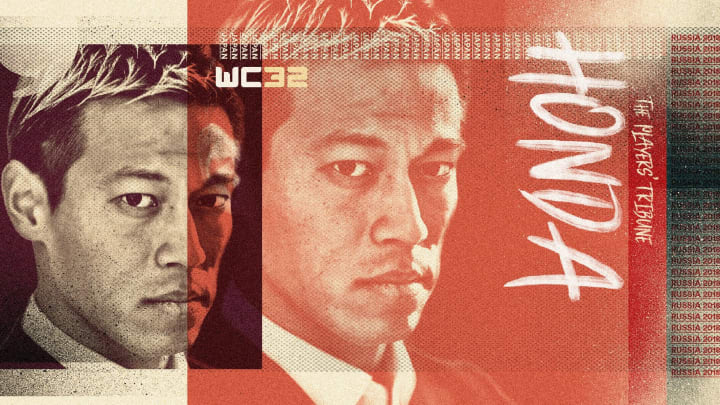
More Than the Ball
Iwant to tell you a story about a tape, a ball and a life mission. Because as I approach another World Cup, and the end of my career, the reason why I’m here — my destiny — is becoming more and more clear to me. So come back in time with me, because the story starts a long, long time ago.
When I was six years old, my father brought a video tape home. This was a big deal. Growing up in Osaka in the early ’90s, my family didn’t have many luxuries. But we did have a VCR and an old TV. I was in the living room doing homework, and my father walked in with a smile on his face.
He said, “Keisuke, come, sit. I want to show you this.”
“What is it?” I said.
“Pelé.”
I remember the sort of zing-zap sound the TV made when you turned it on. Then there was a flash of light across the screen, and the image started to emerge. At first, I didn’t understand what I was watching. It was black-and-white footage. It was hard to make out who was who, or what exactly was happening.
And then I saw him.
Pelé came from the right side of the screen, the ball at his feet, dribbling faster than I had ever seen anyone move a soccer ball.
He was playing his own sport.
“How did he get like this?” I asked my father.
“He is not just playing because it’s fun,” he told me. “He is playing because he knows that if he succeeds, he will be able to survive and take care of his family.”
My father knew this because he’d read about Pelé. I started to read about him too, and I was so inspired. We were not as poor as he had been, but we didn’t have much. I began to look at soccer in a different light. It became more than a game; it became a way out. I began to look at soccer players differently, too. When my father removed the tape, I left our living room and made a promise to myself that — regardless of what came my way — I was going to give everything I had to become a great player and play in the World Cup.
And not just that … I wanted to win it.
When I was in elementary school my parents divorced and I moved in with my grandparents. My father had always told me stories about his childhood, and about his mother — my grandmother.
Her influence grew on me as I became older. She is a hero of mine. But moving in with her at first was very hard for me. You have to understand that life in Japan is very different. The way the older generation approaches all types of issues — from moral to financial — is incredibly difficult to explain to those who haven’t lived it.
One story that my father used to tell was about when he lived in Osaka in the 1960s. He lived with his parents and his sister in a 100 square-foot apartment. It was basically just a single room with a few shelves and a sink. There was so little space that when they all had to sleep — which is the only time everyone was in the apartment — they had to stick their legs into little storage spaces that extended onto the balcony and weren’t nearly as protected from the elements.
My grandmother, and her family, knew the margins of surviving in poverty were so small that everyone needed to be at their best to get as much work done as possible the next day to bring home money. She was strong because she had to be.
My grandmother’s outlook on our family’s life was like, “O.K., we are not rich, and we will never be rich. This is life. We will have modest goals, and we will not complain.”
I didn’t agree with that.
I would clash with my grandmother. We would fight over lots of things, like being late for school or not helping out around the house. When I was eight or nine years old, she would hear stories from my teachers about me staying outside for too long at recess because I was playing soccer. The teachers would have to come out and get me, but I’d have the ball at my feet and I’d try to dribble away from them for as long as possible, until they’d grab me by the jacket.
My grandmother didn’t like this.
I know this will sound alarming, but there were countless times when my head would be dripping with blood after I was disciplined by her. It was just a different way of life. The structure of values, goals and expression in Japan is impossible to translate into other cultures. I didn’t necessarily agree with the way she treated me, but I loved my grandmother with all my heart. My friends did, too. She was a legend around my neighborhood.
You can say what you want about the way she disciplined me, but she taught me to endure — to persevere and be mentally tough.
And I needed that toughness. Because I had all these goals as a kid: I wanted to win the World Cup with Japan, I wanted to play at the San Siro for Milan and I wanted to support my family.
After high school, I signed in the Japanese League with Nagoya Grampus. It was a three-year deal, and in my final year, I was desperate to leave for Europe. My manager at the time, Sef Vergoossen, introduced me to VVV Venlo in Holland. He had managed them for 10 years in the ’80s and told me what a wonderful club it was, and what a great city Venlo was. And he told me that, if I played well there, I could go on to bigger and better things. He promised me a tryout, not a contract, but that was all I needed to hear. I packed my bag and left.
I was 22 years old, and I felt on top of the world. This is the start of my dream, I thought. I joined VVV in January and played out the second half of their season. But something happened that was not part of my career plan.
We got relegated to the second division.
I failed.
But failure was nothing new to me. I had been cut from the professional academy at Gamba Osaka going into high school. Some people might have given up. Everyone around me told me to give up. But, for me, it was an opportunity to prove the world wrong. It’s easy to not fail if you’re not challenging yourself. Every failure reminds me that I’m pushing myself and that there is another exciting challenge ahead of me.
The failure at VVV taught me a valuable lesson. In order to succeed, I needed to change my game. I couldn’t just be a passer, like I always had been. I needed to become a goal scorer. I need the ball.
It wasn’t just my game that changed in Europe — it was my perspective on life, too. Traveling to over 50 countries opened my eyes to the world. I got to know my teammates away from the pitch. And, as we became close, I realized how many of them had grown up in poverty, too, all across Europe and Africa. But the poverty they knew had been much more severe than my own. I learned that many players were sending large portions of their wages home to their families.
I couldn’t believe the selflessness. And it frustrated me that they even had to do that. It was hard for me to imagine what their families must have been going through. As my career progressed from Holland to Russia and then to Italy — and eventually to where I am now in Mexico — I never forgot my teammates at VVV.
That memory is the foundation for my first project: The Yume Foundation, a global initiative to teach the importance of having a dream, which provides scholarships for student-athletes in tough economic situations. It’s important to have a dream since it teaches you how to set goals, persevere through failure and work hard. The lessons learned with a football can be put to use in the real world. We’ve now done 18 soccer camps in such countries as Indonesia, Vietnam, Thailand, Uganda, Cambodia and the United States.
The Yume Foundation eventually developed into Soltilo and Surf Cup Sports. We have over 70 programs and 15,000 kids worldwide, from youth to young professional players, and many of the same philosophies that I learned over the years are what the programs focus on teaching. I’m especially proud of our professional soccer teams in Cambodia (Soltilo Angkor FC) and Uganda (Bright Stars FC) since these teams give kids who dreamed of becoming a professional soccer player the opportunity to have that dream.
My interest in providing opportunities to economically disadvantaged athletes while playing soccer also led to me becoming an angel investor. This allows me to support big ideas, and startups, that that will hopefully make the world a better place. I also believe there is a big opportunity to connect Japan to the world through innovation. Through these different endeavors, I can tackle the issue that so many people in the world struggle with: Poverty.
I know it sounds like a monumental task — and it is — but, more than anything, I want to play a part in ending world poverty.
That’s why most of my off-season is spent traveling the world, meeting with grassroots activists, NGOs, world leaders and children in developing countries. I want to understand the dynamics in every area to understand the big picture. I still don’t have a clear answer to the issue of poverty, but I believe it’s rooted in education.
Every time I put on the Japanese kit, I remember the promise I made — to win the World Cup. I would, and I will, give everything I have to accomplish that goal.
This is my third World Cup, and it could be the final one, so I want to enjoy playing with my friends, which will ultimately lead to the best results as a team. As I get closer to the end of my career, I understand that this tournament stands for so much more than a celebration of soccer. It’s an opportunity to bring the sport together and watch the best our game has to offer, yes, but it’s also a chance to better ourselves. The road here for so many of these players was not easy. And every one of their families went through challenges, too.
It’s worth remembering, always, that this is a game — that this is a sport we play because we love it. It can give us so much. Every kid deserves a chance to get here, to play here.

